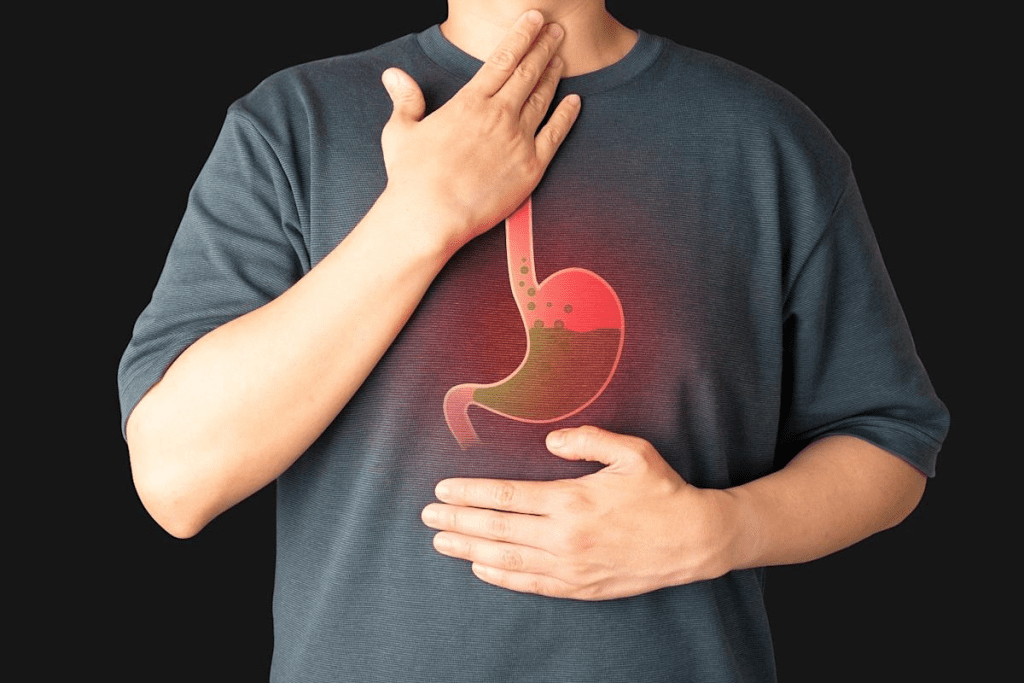Digestive disorders are a big health problem worldwide. They affect millions of people. Knowing the common digestive issues is key to managing and treating them.
Four main conditions affect the digestive system: GERD, IBS, IBD, and peptic ulcer disease. These issues cause discomfort and pain. In the U.S., 60“70 million people deal with digestive problems every year.

Places like LivHospital focus on treating these gastrointestinal issues. We aim to give full care to those with these conditions.
Key Takeaways
- Four major digestive disorders are GERD, IBS, IBD, and peptic ulcer disease.
- Digestive disorders affect 60“70 million Americans annually.
- Understanding these conditions is key to effective management.
- Institutions like LivHospital prioritize treating gastrointestinal issues.
- Comprehensive care is crucial for individuals affected by these conditions.
The Burden of Gastrointestinal Disease in America
Gastrointestinal diseases have a big impact on American society. They affect not just individual health but also the healthcare system as a whole. These diseases are among the most common and expensive health problems in the U.S.
Prevalence Statistics: 60-70 Million Americans Affected Annually
GI issues are very common, affecting about 60 to 70 million Americans each year. This huge number shows how widespread gastrointestinal disorders are. They can be mild or very serious, making it crucial to have good awareness and treatment options.
Some important stats on GI issues include:
- Nearly 1 in 5 adults in the United States experiences some form of gastrointestinal disorder.
- Gastrointestinal diseases account for a significant portion of healthcare utilization, including doctor visits, hospitalizations, and surgeries.
- The economic burden of GI diseases is substantial, with estimated annual costs running into the hundreds of billions of dollars.
Economic and Healthcare Impact of Digestive Disorders
The impact of digestive problems on the economy and healthcare is huge. In 2019, there were about 19 million emergency department visits for digestive issues. Digestive diseases also caused nearly 20% of all hospitalizations from ED visits. That year, around 294,000 deaths were linked to digestive diseases.
The costs go beyond just healthcare. They also include lost productivity and lower quality of life. The total cost is very high, showing the need for more research and better care.
The economic and healthcare impact is seen in many areas:
- Direct medical costs, including hospitalizations, medications, and healthcare services.
- Indirect costs, such as lost wages and productivity due to chronic illness or hospitalization.
- The overall quality of life for individuals suffering from gastrointestinal disorders, which can be significantly impaired.
Gastroesophageal Reflux Disease (GERD)
GERD is a major cause of stomach problems. It’s important to know its causes, symptoms, and treatments. GERD is a chronic condition that affects the lower esophageal sphincter (LES). This causes stomach acid to flow back into the esophagus, leading to gastrointestinal symptoms.

What Causes GERD?
Many factors can lead to GERD, like obesity, pregnancy, and smoking. Hiatal hernia can also make GERD symptoms worse. Knowing these causes helps in finding the right treatment.
- Obesity and overweight
- Pregnancy
- Smoking and tobacco use
- Certain medications (e.g., sedatives, pain medications)
Recognizing GERD Symptoms and Complications
GERD symptoms include heartburn, regurgitation, and trouble swallowing. If not treated, GERD can cause serious problems like esophagitis and Barrett’s esophagus. Spotting these symptoms early is key to avoiding long-term damage.
- Heartburn
- Regurgitation of food
- Difficulty swallowing
- Chest pain
Treatment Options and Management Strategies
Managing GERD involves making lifestyle changes and dietary adjustments. Lifestyle changes include losing weight and avoiding trigger foods. Elevating the bed’s head can also help. Medications like antacids and proton pump inhibitors (PPIs) can reduce acid production.
When to Seek Medical Attention for GERD
If GERD symptoms don’t get better or get worse, see a doctor. Signs that need urgent medical help include trouble breathing, severe chest pain, and vomiting blood. Early treatment can prevent serious issues and improve life quality.
Irritable Bowel Syndrome (IBS)
Irritable Bowel Syndrome (IBS) affects millions worldwide, impacting their quality of life. It causes abdominal pain, bloating, and changes in bowel movements. These symptoms occur together.

Triggers and Causes
Knowing what triggers IBS is key to managing symptoms. Common triggers include certain foods, stress, and hormonal changes. The exact cause of IBS is still unknown. However, abnormal gastrointestinal motility, hypersensitivity, and stress are believed to play significant roles.
“The gut-brain axis is a complex system that can influence bowel habits and sensitivity,” notes a study published.This shows the intricate relationship between the brain and the gastrointestinal tract.
Common Symptoms and Diagnostic Criteria
Symptoms of IBS vary but often include abdominal pain or cramping, bloating, gas, diarrhea, and constipation. Doctors diagnose IBS based on symptoms and medical history. The Rome IV criteria are used, requiring recurrent abdominal pain or discomfort at least one day per week in the last three months.
- Abdominal pain or cramping
- Bloating and gas
- Diarrhea or constipation
- Changes in bowel movements
Managing IBS Through Diet and Lifestyle Changes
Managing IBS often involves dietary changes, lifestyle modifications, and sometimes medication. Keeping a food diary can help identify trigger foods. Common dietary adjustments include increasing fiber intake, avoiding gluten, and following a low FODMAP diet.
A personalized approach to diet and lifestyle can significantly improve IBS symptoms. Regular physical activity, stress management techniques such as meditation or yoga, and adequate sleep are also beneficial.
When to Consult a Doctor About IBS Symptoms
If symptoms persist or worsen, it’s essential to consult a healthcare provider. They can help rule out other conditions and develop a treatment plan. Severe symptoms, such as significant weight loss, bloody stools, or persistent pain, require immediate medical attention.
“Early diagnosis and treatment can make a significant difference in managing IBS effectively,” emphasizes a healthcare professional. This underlines the importance of seeking medical advice if symptoms are severe or persistent.
Inflammatory Bowel Disease (IBD)
Understanding Inflammatory Bowel Disease (IBD) is key to managing its effects on patients. It includes Crohn’s Disease and Ulcerative Colitis. IBD causes chronic inflammation in the digestive tract, affecting quality of life.
Crohn’s Disease: Causes, Symptoms, and Treatment
Crohn’s Disease can affect any part of the digestive tract. The exact cause is unknown but involves genetics, immune response, environment, and gut microbiota imbalance.
Symptoms include diarrhea, abdominal pain, fatigue, weight loss, and reduced appetite. Doctors use endoscopy, biopsy, and imaging to diagnose.
Treatment includes medications to reduce inflammation and manage symptoms. Lifestyle changes, like diet and stress management, are also important.
Ulcerative Colitis: Causes, Symptoms, and Treatment
Ulcerative Colitis causes chronic inflammation and ulcers in the colon and rectum. The exact cause is unknown but involves genetics, immune, and environmental factors.
Symptoms include bloody diarrhea, abdominal pain, urgency, and weight loss. Diagnosis involves colonoscopy, biopsy, and imaging tests.
Treatment includes medications to control inflammation and symptoms. In severe cases, surgery may be needed to remove the colon.
Complications and Long-term Management of IBD
Crohn’s Disease and Ulcerative Colitis can lead to complications like narrowing of the intestine and increased cancer risk. Long-term management involves monitoring, medication, and lifestyle changes.
As “Managing IBD requires a comprehensive approach that includes medical treatment, lifestyle changes, and ongoing monitoring.”
“The key to living with IBD is understanding your condition and working closely with your healthcare provider to manage symptoms and prevent complications.”
” Gastroenterologist
Warning Signs That Require Immediate Medical Attention
People with IBD should watch for warning signs like severe abdominal pain and vomiting blood. Immediate medical attention can prevent serious complications.
- Severe abdominal pain or cramping
- Vomiting blood or black tarry stools
- High fever or chills
- Signs of dehydration, such as excessive thirst, dark urine, and dizziness
By understanding IBD and its management, individuals can lead active and fulfilling lives despite their condition.
Peptic Ulcer Disease
Understanding peptic ulcer disease is key to managing digestive health. Peptic ulcers are sores on the stomach or duodenum’s lining.
H. Pylori and NSAIDs: The Main Causes of Peptic Ulcers
Two main causes of peptic ulcers are Helicobacter pylori (H. pylori) bacteria and NSAIDs. H. pylori infection damages the stomach and duodenum’s lining. This makes them more prone to acid damage.
NSAIDs, like aspirin, can also irritate the stomach lining. This can lead to ulcer formation, especially with long-term use or high doses.
Recognizing Ulcer Symptoms and Potential Complications
Symptoms of peptic ulcers include abdominal pain, which can feel like burning or gnawing. This pain may worsen at night but can be eased by eating or taking antacids. Other signs include nausea, vomiting, and loss of appetite.
If not treated, peptic ulcers can cause serious problems. These include bleeding, perforation, and narrowing of the stomach or duodenum. These issues need immediate medical care.
Treatment Approaches and Healing Process
Treatment for peptic ulcers involves several steps. Medications are used to reduce stomach acid and protect the lining. Proton pump inhibitors (PPIs) and H2-receptor antagonists are common choices.
To treat H. pylori infection, antibiotics are prescribed. It’s important to finish the full treatment to clear the infection.
Prevention Strategies and Risk Reduction
To prevent peptic ulcers, avoid NSAIDs when possible. If NSAIDs are needed, use the lowest dose and combine with a proton pump inhibitor. This can lower the risk.
Changing your lifestyle can also help. Avoid spicy or fatty foods, quit smoking, and manage stress. These actions can reduce the risk of peptic ulcers.
Conclusion: Taking Control of Your Digestive Health
Understanding and managing your digestive health is key to feeling good. We’ve looked at four big gastrointestinal diseases: GERD, IBS, IBD, and peptic ulcer disease. These issues affect many, causing stomach problems and lowering quality of life.
Knowing the symptoms and causes of these diseases is the first step to managing them. It’s important to see a doctor when needed and make lifestyle changes to help your digestion.
Being in tune with your body’s signals is crucial for digestive health. By listening to your body, you can lessen the effects of these diseases. This way, you can improve your digestive health overall.
FAQ
What are the most common gastrointestinal disorders?
The top four gastrointestinal diseases are Gastroesophageal Reflux Disease (GERD), Irritable Bowel Syndrome (IBS), Inflammatory Bowel Disease (IBD), and peptic ulcer disease.
How prevalent are digestive disorders?
Digestive disorders affect a lot of people. About 60“70 million Americans deal with some form of digestive disease every year.
What is the economic impact of digestive diseases?
Digestive diseases are a big deal for the economy. They cause nearly 20% of hospitalizations in the U.S. In 2019, there were 19 million ED visits for digestive issues. That year, 294,000 deaths were linked to these diseases.
What are the symptoms of GERD?
GERD symptoms include heartburn, trouble swallowing, and chest pain. If not treated, it can lead to more serious problems like esophagitis and stricture formation.
How is IBS diagnosed?
Doctors diagnose IBS based on symptoms like abdominal pain, bloating, and changes in bowel movements. These symptoms must last at least three months to be diagnosed.
What are the treatment options for IBD?
IBD treatment includes medicines to reduce inflammation and manage symptoms. Lifestyle changes and surgery might also be needed in some cases.
What causes peptic ulcers?
Peptic ulcers are mainly caused by H. pylori infection and NSAIDs. Stress and certain medications can also play a role in their development.
How can I manage my digestive health?
To manage your digestive health, understand your condition, eat well, and make lifestyle changes. Stick to your treatment plan and see your doctor regularly.
When should I seek medical attention for gastrointestinal symptoms?
Seek medical help for severe or ongoing symptoms like abdominal pain, bleeding, or trouble swallowing. Early treatment can prevent complications and improve your health.
Can digestive disorders be prevented?
Some digestive disorders can’t be prevented, but a healthy lifestyle can help. Eating right, exercising, avoiding triggers, and managing stress can reduce your risk.
References
- National Institute of Diabetes and Digestive and Kidney Diseases. (2021). Digestive diseases statistics for the United States.https://www.niddk.nih.gov/health-information/health-statistics/digestive-diseases
- National Institute of Diabetes and Digestive and Kidney Diseases. (2020). Symptoms & causes of GER & GERD.https://www.niddk.nih.gov/health-information/digestive-diseases/acid-reflux-ger-gerd-adults/symptoms-causes
- National Institute of Diabetes and Digestive and Kidney Diseases. (2017). Definition & facts for irritable bowel syndrome.https://www.niddk.nih.gov/health-information/digestive-diseases/irritable-bowel-syndrome/definition-facts























